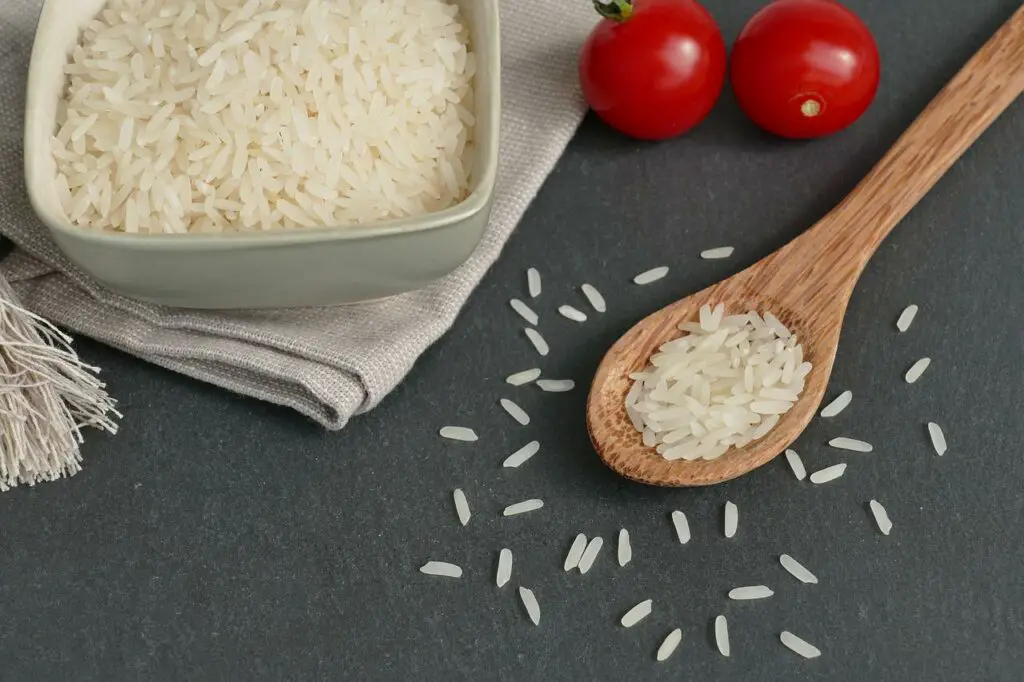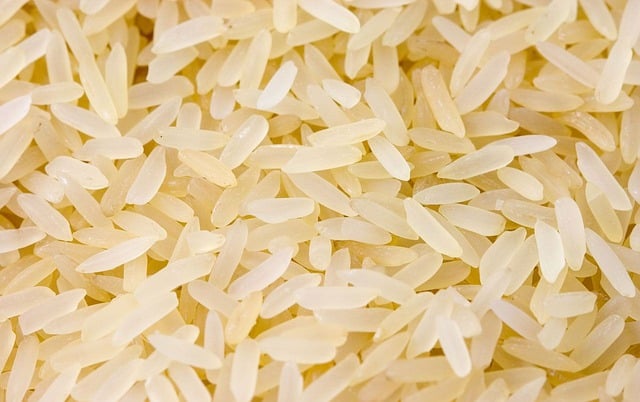Basmati rice is a versatile meal that tastes good with anything.
It continues to gain popularity following the many ads promoting it.
Basmati contains healthy nutrients and this leaves dog owners with the question, can dogs eat Basmati rice?
Yes, dogs can have Basmati rice.
It contains nutrients and minerals which cater to dogs’ dietary needs.
The carbohydrates in this rice provide dogs with enough energy to last them through the day.
This article discusses the benefits and side effects of Basmati rice on dogs.
It also offers information on how best you can prepare the meal and the portions to give your dog.

What nutrients in Basmati rice are beneficial to dogs?
Basmati rice is gluten-free and that means you can feed it to your dog even if it’s sensitive or allergic to some foods.
Better yet, it’s full of healthy nutrients that your dog can benefit from.
These include:
Carbohydrates
Basmati rice contains carbohydrates that a dog’s digestive system easily absorbs.
This carbohydrate converts into energy that dogs need to play and run the whole day.
Unlike other carbohydrates, Basmati rice releases energy slowly, thus sustaining dogs throughout the day.
Fiber
Basmati rice provides sufficient fiber content that dogs need every day.
It facilitates bowel movement and helps dogs manage diabetes by regulating blood glucose levels.
While lack of fiber causes constipation, excessive intake prevents absorption of minerals in a dog’s system.
Antioxidants
Basmati rice is rich in antioxidants that boost the immune system and protects dogs from cancer.
These nutrients also slow down aging in dogs and curbs cell damage.
A diet rich in antioxidants helps to eliminate free radicals in the body, thus protecting dogs from heart disease and cancer.
Vitamin B3
It is rich in vitamin B3 (niacin) which is essential for the development of healthy body cells in dogs.
Dogs that lack this nutrient can experience severe vision impairment which can lead to blindness.

How do you prepare Basmati rice for dogs?
You can prepare Basmati rice for your dog and add it to other ingredients to firm a balanced diet.
The preparation is easy, fast, and doesn’t require extra ingredients.
To prepare Basmati rice for your dog, boil two cups of plain water in a saucepan and pour a cup of rice into it.
Once the water and the rice begin boiling, lower the heat to allow it to simmer.
Cover with a lid and let it cook for between 15 to 20 minutes.
You shouldn’t add seasoning like salt and black pepper to Basmati for dogs.
While salt can cause sodium poisoning which is fatal to dogs, black pepper causes stomach discomfort if taken in large quantities.
You can add boiled chicken to Basmati rice and serve it to your dog at a 1:2 ratio.
This way it will gain protein and carbohydrates in one meal.

How much Basmati rice should dogs eat?
Preparing Basmati rice for dogs is easy but you may be wondering how much you should feed it each day.
The heavier a dog is, the more the amount of rice it will need.
Below is a table showing the amount of rice a dog needs in a day based on its weight.
| Weight (kgs) | Amount of rice per day |
| 0-4.5 | ½ cup |
| 4.6-9 | 1 cup |
| 9.1-13.5 | 1 ½ cups |
| 13.6-18 | 2 cups |
| 18.1-22.5 | 2 ½ cups |
| 22.6-27 | 3 cups |
| 27.1-32 | 3 ½ cups |
| Above 33 | 4 cups |
It’s important to feed your dog the right amount of rice to avoid tummy problems.
Feeding dogs excessive Basmati rice leads to vomiting, loss of appetite, and diarrhea.
It’s advisable to feed dogs rice in small quantities especially if you’re introducing the meal.
In case of any symptoms, consult a veterinarian.
What are the risks of feeding Basmati rice to dogs?
Although Basmati rice is safe and healthy for dog consumption, it can cause risks if dogs consume it in excess.
These include the following:
Some dog breeds find it hard to digest grains containing insoluble fiber like rice.
When these dogs consume Basmati rice in excess, they can experience diarrhea and allergic reactions in the form of itchiness and rashes.
When dogs eat too many foods containing fiber like rice, they’ll experience diarrhea, vomiting, and appetite loss.
It also leads to excessive defecation which curbs the absorption of essential nutrients.
Your dog will as a result experience nutritional deficiencies and become prone to diseases.
For this reason, only feed your dog the recommended amount of rice per day.
FAQs
Can you feed dogs microwaved Basmati rice?
Microwaved Basmati rice isn’t suitable for dog consumption.
Although microwaves can cook the rice fast, the outcome is a chewy and tough meal that can be hard for dogs to chew and swallow.
Can dogs eat plain Basmati rice?
Dogs can eat plain Basmati rice but it’ll be bland.
It’s good to mix it with other foods for a balanced meal.
You can add boiled chicken, beef, lamb, or vegetables to make the meal healthy and delicious.
What’s the difference between white and brown Basmati rice when feeding dogs?
Brown rice is good for dogs for its high-quality nutrition.
However, it’s not recommended for dogs with gastrointestinal issues since it takes longer to
digest, thus heightening the digestive problems.
White rice digests easily in a dog’s digestive system.
However, it has a high glycemic index (GI) which can raise blood sugar levels if a dog consumes in large quantities.
Conclusion
Basmati rice can be a good addition to your dog’s diet.
You can mix it with animal protein and vegetables to give your dog a healthy, balanced meal.
This food contains healthy nutrients that give dogs energy and ensures that their body organs and cells remain functional.
When preparing this meal, remember not to add any flavorings and seasonings as they can be harmful to dogs.
To avoid gastrointestinal issues like diarrhea and appetite loss, feed your dog the right amount of Basmati rice per its weight.
- What Dog Breeds Have Pink Skin? - March 24, 2023
- What Are the Most Inspiring Dog Breeding Quotes? - March 20, 2023
- Can Pheromone Spray Help Improve Dog Breeding Results? - March 19, 2023








